We may not have the course you’re looking for. If you enquire or give us a call on +61 1-800-150644 and speak to our training experts, we may still be able to help with your training requirements.
Training Outcomes Within Your Budget!
We ensure quality, budget-alignment, and timely delivery by our expert instructors.
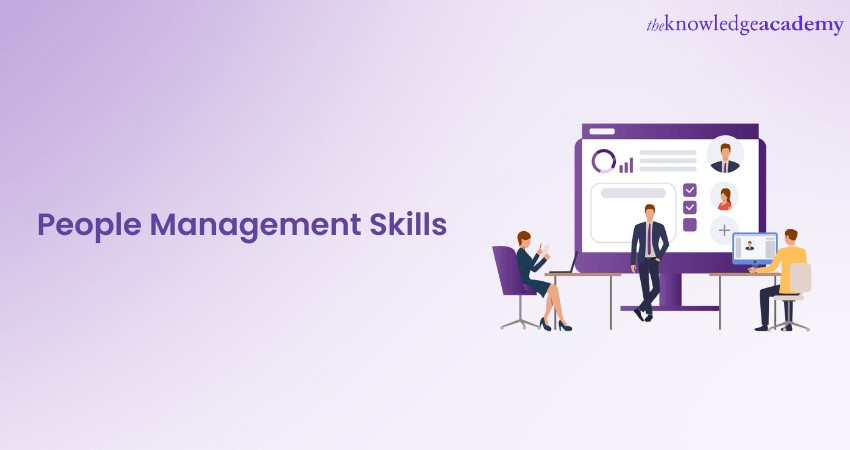
Every successful team has one thing in common - a leader who knows how to harness the magic of People Management. It's more than just about assigning tasks - It's about inspiring diverse mindsets, unlocking potential, and creating a vibe that sparks success. Whether you are handling a small team or managing a large organisation, learning the top People Management Skills is essential.
This blog is here to help you out with that, covering everything from adaptability and inspiring communication to accountability and empathy. So read on, master the best People Management Skills and make your team impactful and unstoppable!
Table of Content
1) What are People Management Skills?
2) Why are People Management Skills so Important?
3) People Management Skills
4) Operating With Clear Vision
a) Endurance
b) Strategic Development
c) Effective Interactions
d) Providing Input
e) Accepting Input
f) Effective Communication
g) Empathetic Connection
h) Adaptability
5) Conclusion
What are People Management Skills?
People Management skills (also known as soft skills) are more complex to define than technical skills. They include skills such as workplace trust, communication, and patience, to name a few.
Put simply, they are the skills you need to treat, communicate with, and lead your people or workforce as a manager for maximum results. A manager equipped with these skills can be the difference between a frustrated, confused and underperforming team and a productive, motivated and engaged team.
Why are People Management Skills so Important?
A great manager with exceptional People Management skills can effortlessly attract attention and loyalty and make things drive within the team. They possess a robust set of interpersonal skills that catalyse productivity. These skills grow increasingly essential, especially in today’s changing work environments.
People Management Skills
Let's delve deeper into each of the 15 essential People's Management Skills, expanding them to provide a comprehensive understanding of their importance and how they exactly contribute to effective leadership.
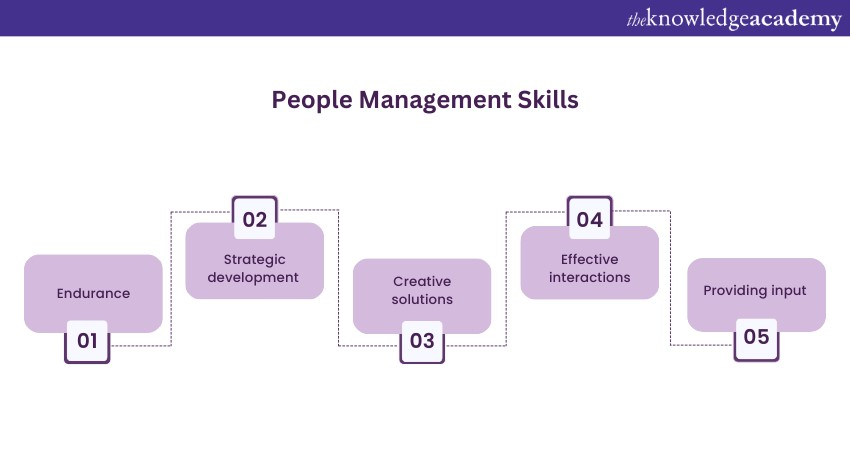
Operating With a Clear Vision
Managing with a clear vision is an essential leadership quality. Clear vision means seeing the bigger picture and all the parts that exist within it. It operates on two levels:
a) You can look at the organisation's current state and see what’s possible now.
b) You can see beyond what’s possible today and what is realistically achievable. You can even envision a path to get there.
Setting a clear, consistent vision for your expectations from employees and the organisation not only steers your strategic planning but can also help you make difficult choices quickly if need be. Your vision acts as a compass and is instrumental in a world of continued uncertainty.
Endurance
Endurance is the ability to sustain effort over time. It is a critical skill for People Managers, who often have to juggle multiple tasks and deadlines, deal with difficult stakeholders, and manage stress.
People Managers can build their endurance by:
a) Setting Realistic Expectations: When People Managers set unrealistic expectations for their teams and themselves, burnout is almost guaranteed. By setting realistic goals and deadlines, leaders can ensure their teams have the stamina to persevere through challenges.
b) Taking Breaks: People Managers need to take breaks throughout the day, even if it is just for a few minutes. Getting up and moving around or taking a few deep breaths can help to reduce stress and improve focus.
c) Delegating: As mentioned above, delegation is crucial for effective People Management. By delegating tasks to others, Managers can free up their time and focus their energy on the most important things.
d) Building a Support System: People Managers must have a support system in place, both at work and at home. Having people they can trust and talk to can help them cope with stress and challenges.
Strategic Development
Strategic development is the process of creating and implementing a plan to achieve organisational goals. It is an important skill for People Managers, who need to be able to develop and execute strategies for their teams and departments.
People Managers can develop their strategic thinking skills by:
a) Understanding the Organisation's Goals: The first step in developing a successful strategy is understanding the organisation's overall goals. People Managers must be able to align the team's goals with the organisation.
b) Analysing the Environment: Additionally, People Managers must be able to analyse the external environment, including industry trends and competition. This information can help identify opportunities and threats and develop risk mitigation strategies.
c) Developing Creative Solutions: Quite often, strategic development requires People Managers to think outside the box and find creative solutions to problems. This can be done through:
a) Brainstorming sessions with team members
b) Seeking input from customers and stakeholders
c) Researching new ideas and technologies
d) Communicating the Strategy: Once a strategy is developed, it's essential to communicate it clearly and concisely to the team. People Managers must explain the strategy's goals, objectives, and implementation.
Elevate your leadership game and nurture a winning team with our Successful People Management and Team Leadership Course. Take the first step towards success today!
Creative solutions
Creative solutions are the ability to come up with new and innovative ideas to solve problems. This is an important skill for People Managers, who need to be able to think outside the box and develop new ways to achieve their goals.
People Managers can develop their creative thinking skills by:
a) Brainstorming: Brainstorming is a great way to generate new ideas. People Managers can brainstorm with their team members, or they can brainstorm on their own.
b) Seeking input from customers and stakeholders: Customers and stakeholders often have valuable insights that can be used to develop new ideas. People Managers should seek input from these groups whenever possible.
c) Researching new ideas and technologies: There are always new ideas and technologies emerging. People Managers should stay up-to-date on the latest trends and developments in their industry.
Effective Interactions
Effective interactions are the ability to communicate and collaborate effectively with others. This is an essential skill for People Managers, who need to be able to build relationships with their team members, customers, and stakeholders.
People Managers can develop their effective interaction skills by:
a) Being a Good Listener: Effective interactions require listening to the other person and understanding their perspective. People Managers should take the time to listen to their team members, customers, and stakeholders.
b) Being Clear and Concise: When communicating, it is important to be clear and concise. People Managers should avoid using jargon or technical language that their audience may not understand.
c) Being Respectful: It is important to be respectful of others, even if you disagree with them. People Managers should create an environment where everyone feels comfortable sharing their ideas and opinions.
Providing Input
Providing input is the ability to give feedback to others in a constructive way. This is an important skill for People Managers, who need to be able to help their team members grow and develop.
When providing input, People Managers should:
a) Be Specific: People Managers should focus on specific behaviours or actions rather than general statements.
b) Be Timely: People Managers should provide feedback as soon as possible so that the recipient can learn from their mistakes and improve their performance.
c) Be Constructive: People Managers should focus on how the recipient can improve rather than just criticising them.
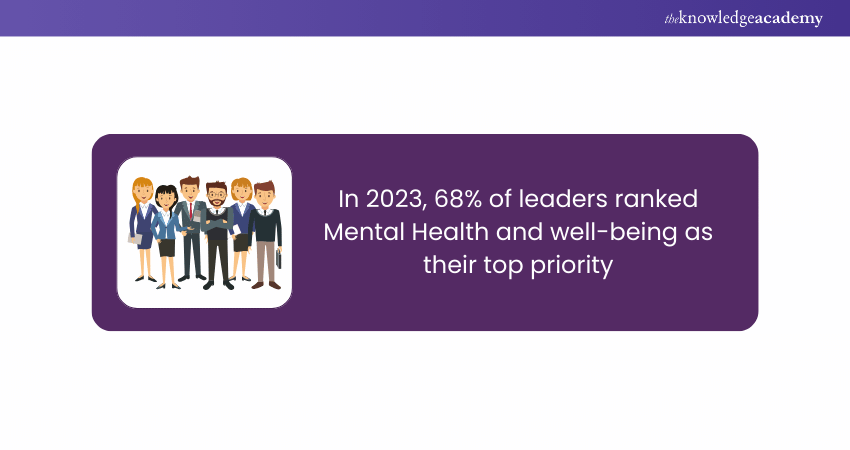
Accepting Input
Accepting input is the ability to receive feedback from others in a positive and constructive way. This is an important skill for People Managers, who need to be open to feedback in order to grow and develop.
When receiving input, People Managers should:
a) Listen Carefully: People Managers should take the time to listen to the feedback and understand the other person's perspective.
b) Ask Clarifying Questions: If People Managers do not understand the feedback, they should ask clarifying questions.
c) Be Open to Feedback: People Managers should be open to even negative feedback. They should remember that feedback is an opportunity to learn and improve.
Effective Communication
Effective communication is the ability to convey information clearly and concisely. This is an essential skill for People Managers, who need to be able to communicate with their team members, customers, and stakeholders in a way that they understand.
When communicating, People Managers should:
a) Be Clear and Concise: People Managers should avoid using jargon or technical language that their audience may not understand.
b) Tailor Their Message to Their Audience: People Managers should tailor their message to their audience's needs and interests.
c) Use Multiple Communication Channels: People Managers should use a communication channels, such as email, phone calls, etc. to reach their audience.
Empathetic connection
Empathetic connection is the ability to understand and share the feelings of others.
This skill is crucial for individuals in managerial roles as it enables them to establish connections with their team members and foster a conducive workplace atmosphere.
People Managers can develop their empathetic connection skills by:
a) Listening Actively: Active listening entails focusing on the words, body language, and tone of voice of the other person. People Managers should use active listening skills to understand their team members' feelings and perspectives.
b) Being Mindful of Their Own Emotions: People Managers should be mindful of their own emotions and how they are affecting their interactions with others.
c) Being Supportive: People Managers should be supportive of their team members and offer them help and encouragement when they need it.
Unlock your team's full potential with our Staff Motivation Training and watch your business thrive. Join us today to inspire, engage, and achieve greater success together!
Adaptability
Adaptability is the ability to change or adjust in response to new circumstances. It is an essential skill in People Management, as the world is constantly changing, and they need to be able to adapt their strategies and approaches accordingly.
People Managers who are adaptable can:
a) Think outside the box and come up with new solutions to problems.
b) Be open to feedback and willing to change their approach when necessary.
c) Be comfortable with uncertainty and ambiguity.
d) Be able to quickly learn new things and adapt to new situations.
Confidence
Confidence entails having faith in one's own capabilities.It is an important skill for People Managers, who need to be able to inspire and motivate their team members.
People Managers can develop their confidence by:
a) Setting Realistic Goals: When People Managers set realistic goals for themselves and their teams, it helps them to build confidence in their abilities.
b) Celebrating Successes: It is important for People Managers to celebrate their successes, both big and small. This helps to build confidence and momentum.
c) Learning From Failures: Everyone makes mistakes. People Managers can build confidence by learning from their failures and using them as opportunities to grow and improve.
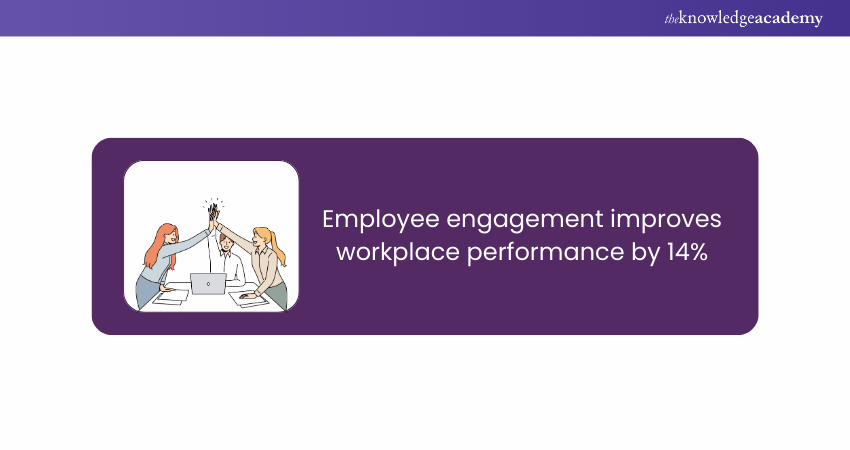
Curiosity About Others
Curiosity about others helps one learn about other people and their experiences. For individuals in leadership positions, developing the ability to establish strong connections with team members and foster a constructive work atmosphere is crucial.
People Managers can develop their curiosity about others by:
a) Asking Questions: People Managers should ask their team members questions about their interests, their experiences, and their goals.
b) Listening Actively: People Managers should listen actively to their team members' responses and show that they are interested in what they have to say.
c) Being Respectful: People Managers should respect their team members' differences and create an environment where everyone feels comfortable sharing their thoughts and ideas.
Active Listening
Active listening involves focusing on the other individual's words, body language, and tone of voice. It is an essential skill for People Managers, who must understand their team members' needs, concerns, and perspectives.
People Managers can develop their active listening skills by:
a) Putting Away Distractions: When People Managers are listening to their team members, they should put away all distractions, such as their phones and computers.
b) Making Eye Contact: People Managers should make eye contact with their team members when they are listening to them.
c) Nodding and Smiling: People Managers should nod and smile to show that they are listening and that they understand what their team members are saying.
d) Asking Clarifying Questions: If People Managers do not understand something that their team member is saying, they should ask clarifying questions.
Decision-making
Decision-making involves recognising and selecting the most optimal course of action within a specific context. It's a vital skill for Managers, who must be able to make decisions in the best interests of their team and the organisation.
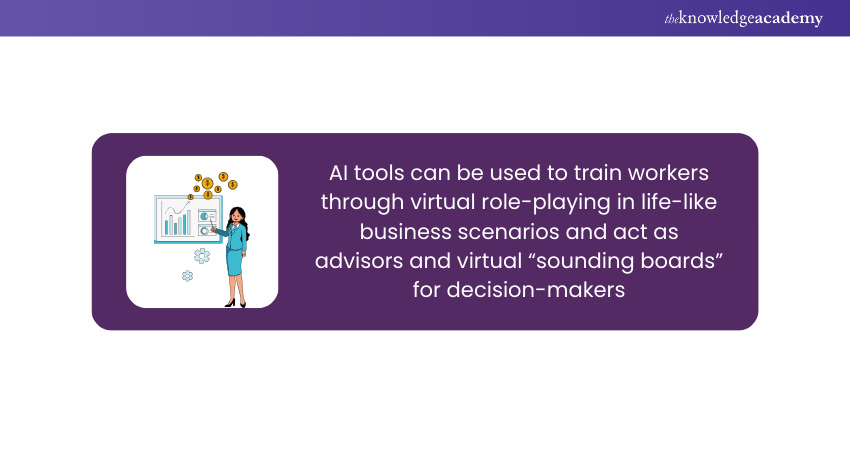
People Managers can develop their decision-making skills by:
a) Gathering Information: Before making a decision, People Managers should gather as much information as possible. This includes information about the situation, the different options available, and the potential consequences of each option.
b) Analysing the Information: Once People Managers have gathered information, they need to analyse it carefully to identify the best course of action.
c) Weighing the Risks and Benefits: People Managers need to weigh the risks and benefits of each option before making a decision.
d) Making a Decision and Taking Action: Once People Managers have made a decision, they need to take action and implement it.
Leadership Qualities
Leadership involves the capacity to encourage and drive others towards a shared objective. People Managers need to have good People Management Skills to be successful.
Some of the most important leadership qualities include:
a) Vision: People Managers must have a clear vision for their team and the organisation. They must articulate their vision and inspire their team members to achieve it.
b) Integrity: People Managers need to be honest and ethical. They need to build trust with their team members and stakeholders.
c) Decisiveness: People Managers need to be able to make decisions quickly and effectively. They need to be able to take risks and deal with uncertainty.
d) Accountability: People Managers need to be accountable for their actions and the actions of their team members. They need to admit when they are wrong and learn from their mistakes.
Support and Guidance
Support and guidance are also essential People Management Skills. People Managers need to be able to provide their team members with the support and guidance they need to be successful. This includes:
a) Setting clear expectations and providing feedback.
b) Providing training and development opportunities.
c) Empowering team members to make decisions and take risks.
d) Creating a positive and supportive work environment.
e) Being available to answer questions and provide assistance.
Ready to lead with confidence and excellence? Join our Leadership Training and empower your potential today.
Conclusion
In conclusion, mastering People management Skills is the the golden key to unlocking better teamwork, improved productivity, and assured organisational success. Managers can inspire and guide their teams by developing strong communication, empathy, and problem-solving abilities. Investing in these skills not only benefits the leaders but also creates a positive and thriving workplace environment.
Unlock your potential and become a powerful strategic leader through our comprehensive HR Leadership Training – Sign up now!
Frequently Asked Questions

The four P's of People Management form a framework to manage and lead teams effectively. They are:
1) People: Understand and address the needs of team members.
2) Process: Establish clear processes and workflows to ensure efficiency.
3) Purpose: Clearly define goals and objectives of the team.
4) Performance: Monitor and evaluate team performance.

Assessing People Management Skills involves gauging a range of competencies crucial for effective leadership. Here are some methods to consider:
1) Performance reviews
2) 360-degree feedback
3) Skills assessments
4) Behavioral interviews
5) Self-evaluations
6) Training and development programs

The Knowledge Academy takes global learning to new heights, offering over 30,000 online courses across 490+ locations in 220 countries. This expansive reach ensures accessibility and convenience for learners worldwide.
Alongside our diverse Online Course Catalogue, encompassing 19 major categories, we go the extra mile by providing a plethora of free educational Online Resources like News updates, Blogs, videos, webinars, and interview questions. Tailoring learning experiences further, professionals can maximise value with customisable Course Bundles of TKA.

The Knowledge Academy’s Knowledge Pass, a prepaid voucher, adds another layer of flexibility, allowing course bookings over a 12-month period. Join us on a journey where education knows no bounds.

The Knowledge Academy offers various People Management Courses, including the Successful People Management and Team Leadership Course and the Workforce Resource Planning Training. These courses cater to different skill levels, providing comprehensive insights into People Management Challenges.
Our Human Resources Blogs cover a range of topics related to People Management, offering valuable resources, best practices, and industry insights. Whether you are a beginner or looking to advance your People Management skills, The Knowledge Academy's diverse courses and informative blogs have got you covered.
Upcoming HR Resources – Learn about Human Resources Batches & Dates
Date
 Successful People Management and Team Leadership
Successful People Management and Team Leadership
Fri 10th Jan 2025
Fri 28th Feb 2025
Fri 4th Apr 2025
Fri 16th May 2025
Fri 11th Jul 2025
Fri 19th Sep 2025
Fri 21st Nov 2025







 Top Rated Course
Top Rated Course



 If you wish to make any changes to your course, please
If you wish to make any changes to your course, please


